BASKETBALL
COGNITIVE DEVELOPMENT SPORTS PROGRAMBASKETBALL - Think smart development program
Play to think smart basketball programmes are open for children of all ages and abilities.
We use age specific drills, ball sizes and height adjustable hoops to put our students in a position to succeed, have fun, and develop a passion for Basketball and Sports. Our program empowers children to progressively develop their cognitive skills, learn or improve their basketball game and develop injury prevention practices.
Cognitive development objectives
Students think they are playing, you know they are learning:
Intentional reflective thinking
How to develop a meaning-making process that leads to a deeper understanding?
Through intentional reflective thinking students spend time thinking about the results of their actions, they figure out why some efforts work while others do not. Not only do they reflect after the fact, but they can bring this reflective frame of mind to the problem at hand and develop their skills of future planning. As coaches we recognize that every inadequate answer is adequate in another context... and inspire children to pursue no single vision of excellence but design something new from all the resources available for their creative imagination and discoveries.
Communication
How to develop listening and meaningful consensus?
One of our goals is to create a dialogue-like environment in class. We never required students to raise their hands to speak. Instead we sit in a circle and let the conversation flow through us. Over time and with consistent practice, students learn that it is ok to wait for someone to finish speaking a thought before they jump in. By giving each student a predictable space to express itself we eliminate the urge to speak and create a culture of listening and meaningful consensus.
Collaboration
How to build learning partnerships?
It takes time and deep commitment to go beyond the platitudes about teamwork and create an environment of ongoing collaboration and collective thinking.
By mastering the reflective frame of mind students learn to collaborate by acting as a learning community that constructs shared understandings through sustained dialog.
Learning partnerships foster profound learning by building meaningful consensus, acknowledging one's inadequacies, posing one’s own problems. This creates an environment where trust, vulnerability and shared vision become the foundation for risk taking, humour, compassion and the presence of a moral purpose. We co-create meaning by listening to each other’s stories as we are each the authors of our own lives.
Thinking Systems
How to co-create meaning, decisions and systems that are more likely to produce the outcome we desire?
Thinking systems enable us to see the big picture, the small details that make it up and the way parts interact over time. Through the use of thinking systems our coaches provide students with multiple thinking tools. These tools assist problem-solving through a creative and indirect approach and help with the understanding of complex issues. Through the use of thinking systems students develop their ability to identify the cause, sequel and consequences. This improves their planning skills, adaptability, resilience and their capabilities to obtain the desired results.
Aspirations
How to develop a sense of self, self-motivation and self-control?
The process begins with this deceivingly simple question. What do you want to create? Can we ask young people this question? At first children will not know how to answer. They will tend to say what they think adults want to hear. But if we persist, eventually they will realize that we really want them to give us their answer, not the answer we wanted them to tell us in the past.
When children get into the habit of defining their goals, visions and aspirations, they are developing a true skill - a skill that young people need to learn if they are to master their life building process.
Efficacy
How can we influence the problems we care about?
When we teach students to think, we are interested not only in the answers they know. We want to closely observe them when they don’t know the answer. We inspire students to solve an unknown, challenging problem by using all of the capabilities we think of as intelligence: reasoning, insightfulness, intellectual perseverance and creativity. When children are able to connect action and interaction (cause and effect), they no longer see fragmented parts, people, events, problems and themselves as separate and unconnected. They feel greater compassion for others, they see themselves as part of the situation and become resilient and less are likely to blame.
With a foundation of curiosity, hopefulness, and knowledge about how to collaborate about complex issues, it is natural that our students mature to dealing with larger community issues while building a vision from their hopes and dreams.
We empower a community of lifelong learners and inspire students to build their vision from their hopes and dreams and become a creative workforce that solves real life problems.
Age descriptions
3-5 Yr Old
Size 3 B-Balls
Students learn through play and storytelling. The main goal is to instill their passion for the game of basketball .
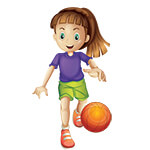
6-9 Yr Old
Size 4-5 B-Balls
At this stage concentrate to develop the person first, athlete second and then the basketball player.
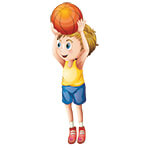
9-12 Yr Old
Size 6-7 B-Balls
Based on each player's motivation and objective we fuel their vision in order to up their potential and reach their goals.
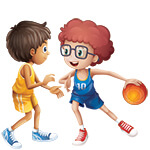
Basketball Curriculum
We group students according to ability; age will also be taken into consideration.
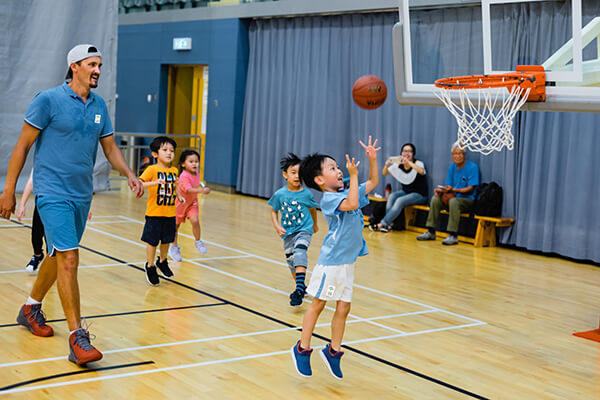
BEGINNER
Duration: 60 minutes
Athleticism
Jumping
Balance
Motor coordination - gross motor skills, fine motor skills, eye hand coordination, ambidexterity, accuracy/hand accuracy, spatial awareness, rhythm
Observation, concentration and focus.
Basketball fundamentals
Footwork
Shooting
Dribbling
Passing
Defense
Rebounding.
Play the game of basketball
Play freely
Cooperate & coordinate with others
Learn the rules.
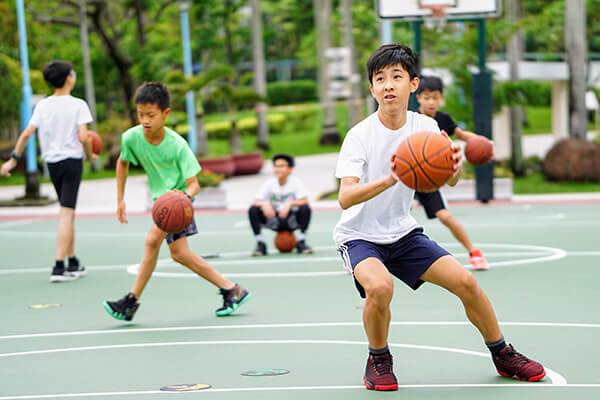
INTERMEDIATE
Duration: 60 - 90 minutes
Athleticism
Form (running and movement technique)
Strength of the hands, core, legs, shoulders, and arms.
Coordination, balance and agility
Foot speed and quickness (forward, backward, side to side, and diagonal)
Spatial awareness and position planning
Injury prevention practices.
Basketball Knowledge IQ
Set screens properly
Read the direction rebounds typically go
Make use of correct defensive positioning
Learn to get open
Control the speed of the game
Further improve Fundamentals.
Play the game of basketball
Play friendly matches
Play 1 on 1 and 3 on 3
Change team roles
Learn set plays and team roles.
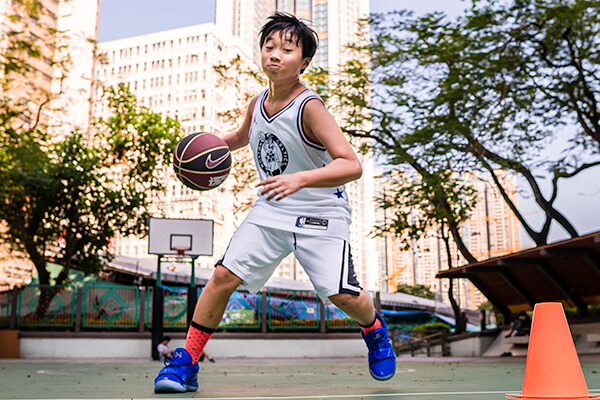
ADVANCED
Duration: 60 - 120 minutes
Athleticism
Reaction time / mental chronometry
Flexibility
Proprioception and kinesthesia
Hand speed and quickness
Endurance.
Basketball Flow EQ
Planning, perseverance and self discipline
Focus on "Learning Goals" instead of "Outcome Goals"
Work ethic
Fine tune Fundamentals
Handle emotions and nerves
Reduce fear of failure and handle failure as a teacher
Develop principles for choice making
Confidence, Resilience and tenacity
Conflict management and learning from other people's views
Differentiate the player from the person.
Play the game of basketball
Play physically active refried games
Play Five vs Five
Apply set plays & team roles.
Testimonials

Leo (11 y.o) was a bright and curious child with a lot of potential, however he lacked focus, confidence and was prone to emotional outbursts.
After 3+ years of attending PTTS, Leo has developed self confidence, found a sport he loves, he is now able focus well, strategize and work hard despite challenges and has evolved in to a happy and balanced kid. As Parents, we have learned more about coaching kids through positive support and constructive inquiries.
Ms M. Lee, Leo’s
Before joining Ptts basketball programme Clement (6 yr) was a passive boy who did not like taking risks. He didn’t want to try new things due to the lack of confidence. He was quite stubborn and liked to do things in his own way.
After 2+ years of attending PTTS, Through fun physical activity and games, he has learned important building blocks to becoming a better person, how to face failure & recover from mistakes, Cooperate with teammates & show respect, and lastly to forgive others and show empathy. As a parent, I have learned a great deal from PTTS in dealing with Clement.
Sandra, Clement’s mom
Max (8y.o.) was always shy and slightly timid. According to feedback from both teachers and coaches, this projected in both class and sports which potentially could impact his development.
After attending PTTS for 2 years, He has not only rediscovered his love for basketball and other organised sports... But just as important, found a confidence in class to communicate his ideas and thoughts more confidently, which has positively impacted his progress according to Teacher reports.
Amy & Brandon, Max’s parents
Caleb (6 y.o.) is very intelligent and a quick and highly motivated learner, but he was always very impatient and sometimes could not control his emotions.
After attending PTTS for 2 years, Caleb has developed much better control through seeing things from more perspectives and learning techniques of calming himself down. He is also building teamwork skills through really enjoying him in his basketball lessons!
Karen Lee, Caleb’s mother